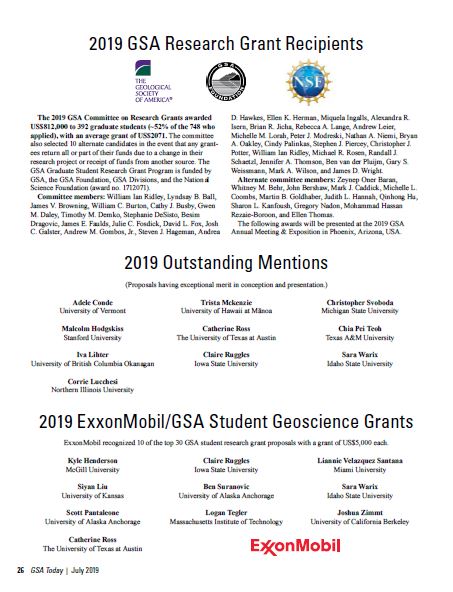- U.S. Department of Health & Human Services

- Virtual Tour
- Staff Directory
- En Español

You are here
Grants & funding.
The National Institutes of Health is the largest public funder of biomedical research in the world. The NIH invests most of its nearly $48 billion budget in medical research seeking to enhance life and to reduce illness and disability. NIH-funded research has led to breakthroughs and new treatments helping people live longer, healthier lives, and building the research foundation that drives discovery.
three-scientists-goggles-test-tube.jpg

Grants Home Page
NIH’s central resource for grants and funding information.
lab-glassware-with-colorful-liquid-square.jpg

Find Funding
NIH offers funding for many types of grants, contracts, and even programs that help repay loans for researchers.
calendar-page-square.jpg

Grant applications and associated documents (e.g., reference letters) are due by 5:00 PM local time of application organization on the specified due date.
submit-key-red-square.jpg

How to Apply
Instructions for submitting a grant application to NIH and other Public Health Service agencies.
female-researcher-in-lab-square.jpg

As you begin your journey in search of NIH grant funding, learn about the structure of NIH and why it’s important to successfully navigate the grants process.
binder-with-papers-on-office-desk-square.jpg

Policy & Compliance
By accepting a grant award, recipients agree to comply with the requirements in the NIH Grants Policy Statement unless the notice of award states otherwise.
blog-key-blue-square.jpg

Grants News/Blog
News, updates, and blog posts on NIH extramural grant policies, processes, events, and resources.
scientist-flipping-through-report-square.jpg

Explore opportunities at NIH for research and development contract funding.
smiling-female-researcher-square.jpg

Loan Repayment
The NIH Loan Repayment Programs repay up to $50,000 annually of a researcher’s qualified educational debt in return for a commitment to engage in NIH mission-relevant research.
Connect with Us
- More Social Media from NIH
- Communications
- Computer Science
- Criminal Justice
- Environmental Management
- Forensic Psychology
- Healthcare Admin
- Human Resources
- Project Management
- Social work
- Special Education
- Sports Management
- Supply Chain Management
- Adult Education
- Business Intelligence
- Early Childhood Education
- Educational Technology
- Homeland Security
- Information Systems Security
- Information Technology
- International Business
- Management Information Systems
- Nonprofit Management
- School Counseling
- Academic Publishing Guide
- Building a Graduate School Resume or CV
- Choosing Between a Thesis or Non-thesis Master's Degree
- Expert Guide to Studying Abroad
- FAQ: Online Master's Degrees
- Grad School Guide Book
- Graduate School for Students with Disabilities
- Green Graduate Degrees
- How to Be a Successful Grad Student
- How to Choose the Right Graduate Program
- How to Get a Master's Degree in an Unrelated Field
- How to Transfer College Credits in Grad School
- How to Write a Winning Personal Statement
- Inside Graduate Admissions
- Ivy League Grad Schools
- Master's Degrees for Veterans
- Master's Degree for Women
- Mental Health in Grad School
- Progressive LGBTQ Graduate Degrees
- Should You Apply for a Graduate School Assistantship?
- Surviving Grad School with a Family
- Taking a Gap Year Before Grad School
- Women in STEM Graduate Resources
- Writing a Successful Statement of Purpose
- Alternative Ways to Pay for School
- The Best Part-Time Jobs During Grad School
- Company Funded Graduate School
- FAFSA For Grad Students
- Financial Aid Resources
- Graduate Student Loans
- Paying for Your Master's Degree
- Paying Off Student Loans
- Paying for Your PhD
- Fellowship Opportunities
- LGBTQ Scholarships
- MBA Scholarships
- Scholarship Resources
- Scholarships for Veterans
- Scholarships for Women
- Crushing the GRE Guidebook
- GMAT Guidebook
- Guide to the LSAT
- MCAT Prep for Medical School
- Study Guide: Exam Resources
- TOEFL Prep for Non-Native English Speakers
- Financial Aid Grants for Graduate School Students
Grants for Graduate School Students
Tips for securing funds for advanced degrees.
For those who want to advance in their careers, graduate school can be a good investment to help them meet their goals. However, this investment can be extremely costly, so students may rely on different types of financial aid to help them pay for their advanced education. Grants are an excellent form of financial aid because, like scholarships, they do not have to be paid back. This guide discusses the places where students can find grants and how they can increase their chances of winning them.
FAQ: Understanding Grants for Graduate School
Students who are looking for funding for their graduate studies may have many questions about how to receive grants. The following are the answers to some of those questions.
What is a grant for graduate school?
Grants are a form of financial aid that do not have to be repaid and are often provided to students based on their financial need. In some cases, the organization providing the grant may also consider other factors, like academic performance, when awarding these funds.
Who is eligible to receive a grant in grad school?
Generally, students must be enrolled in an accredited college or university in order to be eligible to receive a grant. Also, depending on the award, there may be other eligibility requirements, such as minimum grade point average, type of degree program, and research goals.
What’s the difference between grants and fellowships?
Grants are generally offered to students based on their financial need, while fellowships are often based on academic achievement and research.
What is the application process like?
The application process for grants is similar to that of scholarships. In some cases, as with some governmental awards, students can be considered by filling out a Free Application for Federal Student Aid. In other cases, students are required to fill out a separate application to receive a grant, and in addition to being asked for financial information, they may be required to submit a statement about their academic achievements and goals.
What are the different types of grants for grad students?
Grants can be provided by public and private sources, such as government agencies, professional organizations, corporations, and the schools that students attend. Some grants are provided based on the students’ demographic or the field of study they’re pursuing.
- Federal. The federal government offer grants to graduate students that are based on financial need, including the Teacher Education Assistance for College and Higher Education (TEACH) Grant , Fulbright Grants , and Iraq and Afghanistan Service Grants .
- State. Just as students can receive grants from the federal government to fund their graduate studies, they may also be able to receive grants from the state they live in. For example, the Colorado Graduate Grant provides up to $5,000 for students who demonstrate financial need, and the Ohio Department of Natural Resources offers $2,000 grants for earth science graduate students to conduct research.
- School specific. Schools want to attract the best students to their graduate programs, so they may offer grants to help those who show promise pay for their education. For example, the State University Grant Program is available to graduate students attending schools in the California State University system, and Michigan State University provides funding for master’s and doctoral fine arts students through its University Fellowship Programs .
- Organization and corporate grants. Professional and non-profit organizations, as well as private companies, offer grants to help students get the advanced education they need to enter their professions—which goes a long way toward building a strong workforce.
- By demographic. Demographics may also play a role in the grants that graduate students can receive. Some grants are provided to members of a certain race, for example, to help bridge the gap of underrepresentation in a specific field.
- By field. Colleges and universities, as well as professional organizations, may offer grants based on what program the student is enrolled in.
Recommended Online Programs
Students can find grants in a variety of untapped places. There are community-based organizations that provide scholarship support in various interest areas (e.g., business) and there are small trusts/foundations often administered by community foundations and local banks. In addition, many national organizations provide scholarship and grant support for students who meet their defined criteria. Students should monitor philanthropy websites and take the time to do Internet searches. A number of professional organizations also sponsor writing/research competitions that often come with scholarships or cash prizes.
Patricia E. Salkin, Provost and CAO of Graduate and Professional Divisions at Touro College
18 Grants for Graduate School
Grants for graduate school can come from a variety of sources, so students should be aware of all of their options in order to win as many awards as they can. The following are some examples of these grants, and the qualifications students are expected to have in order to win them.
Federal Grants for Graduate Students
U.s. department of education: teacher education assistance for college and higher education (teach) grant.
Award: Up to $4,000
Deadline: Late October
Graduate students who are studying to become teachers can receive this grant in exchange for committing to work at schools in low-income areas for a minimum of four years. Students are eligible to receive this award if they are preparing to teach in numerous subject areas, such as mathematics, foreign language, science, special education, and English. In addition, applicants must have at least a 3.25 grade point average or score above the 75th percentile on college admissions exams.
U.S. Department of Education: Iraq and Afghanistan Service Grant
Award: Up to $6,095
Deadline: Varies
This grant is available to students whose parent or guardian died during military service in Afghanistan or Iraq after September 11, 2001. Applicants must be under the age of 24 or enrolled in college when their parent or guardian died.
U.S. Department of State: Fulbright Grants
Award: Varies
Fulbright Grants are designed to promote international studies and research projects. Some of the countries that students may use the grant to study in include Australia, Germany, Uganda, Indonesia, and Portugal.
Fellowships for Graduate Students
Dolores zohrab liebmann fund: dolores zohrab liebmann fellowships.
Award: Full tuition plus $18,000 stipend
Deadline: Early January
Based on academic performance and financial need, these fellowships are available to students enrolled in graduate programs in the natural sciences, humanities, or social sciences. Students must attend one of the organization’s designated colleges or universities in order to receive this annual award. Fellowships are renewable for up to three years.
Institute for Humane Studies: Humane Studies Fellowship
Award: Up to $15,000
Deadline: Mid-February
Designed to support teaching and scholarship in the humanities and social sciences, this fellowship is available to students enrolled in doctoral programs on a full-time basis. In order to qualify, students should be studying areas such as sociology, history, political science, economics, and law. Applicants should describe the research they intend to conduct and explain how it will advance classical liberal ideas.
National Academies of Sciences, Engineering, and Medicine: Ford Foundation Fellowship Programs
The National Academies of Sciences, Engineering, and Medicine provides predoctoral, dissertation, and postdoctoral fellowships through the Ford Foundation Fellowship Programs. These awards are available to students in a variety of academic disciplines, including archaeology, history, earth sciences, computer science, and art and theater history. In addition, students must demonstrate high academic performance and the ability to contribute to the field as a teacher or researcher.
Organization & Corporate Grants for Graduate Students
American cancer society: doctoral training grants in oncology social work.
Award: $20,000
Deadline: Mid-October
This grant is available to doctoral students studying social work who want to conduct oncology research. This is a two-year award that may be renewable.
Geological Society of America: Graduate Student Research Grants
Award: Up to $5,000
Deadline: Early February
The Geological Society of America offers grants for students in geological sciences master’s and doctoral programs who are conducting research. Applicants must be a member of the organization in order to receive the award.
University Film and Video Association: Carole Fielding Student Grant
Award: Up to $1,000
Deadline: Mid-December
Graduate students enrolled in film and televisual arts programs are eligible to receive this grant. Applicants should provide an in-depth description of their research project with information on proposed budget, how the project will advance the field, and how they plan to present their findings. Students must be sponsored by a professor who is a member of the University Film and Video Association.
Grants for Graduate Minorities
American anthropological association: aaa minority dissertation fellowship program.
Award: $10,000
Deadline: Early March
This grant is available for doctoral anthropology students. Applicants must be a member of an underrepresented racial group, such as Pacific Islander, African American, Latino, and Asian American. In addition, students must demonstrate academic excellence.
American Society of Criminology: Ruth D. Peterson Fellowship for Racial and Ethnic Diversity
Award: $6,000
The Ruth D. Peterson Fellowship for Racial and Ethnic Diversity is available to minority students--such as Asians, Latinos, and African Americans--enrolled in a doctoral criminal justice or criminology program. Students must demonstrate acceptance in a criminology or criminal justice Ph.D. program, as well as financial need.

Wisconsin Higher Educational Aids Board: Indian Student Assistance Grant
Award: Up to $1,100
This grant is available to Wisconsin graduate students who are at least 25 percent Native American. In order to receive this award, students must be enrolled at the University of Wisconsin, independent colleges and universities, proprietary institutions, or tribal colleges in the state.
Grad School Grants for Women
American association of university women: career development grants.
Award: Up to $12,000
Deadline: Mid-November
This grant is designed to help women get the education they need to advance in their careers. Eligibility requirements include enrollment in an advanced degree program and financial need.
American Physical Society: M. Hildred Blewett Fellowship
Award: Up to $45,000
Deadline: Early June
The American Physical Society provides this fellowship to female physics students who are returning to their studies after a hiatus. In order to be eligible, students must have completed some work toward their physics doctoral degree.
Zonta International Foundation: Amelia Earhart Fellowship
This award is designed to encourage women to pursue the aerospace sciences or aerospace engineering fields. Students should be enrolled in an aerospace studies doctoral program to receive this award.
Field-Specific Grants for Grad School
American psychological association: grants in aid for students.
Deadline: Late September
The American Psychology-Law Society, which is a division of the American Psychological Association, offers grants to graduate students who want to conduct research on psycholegal issues. Applicants must submit information describing their project and its significance.
National Science Foundation: Graduate Research Fellowship Program
Award: $34,000
This fellowship is for students enrolled in research-based science, technology, engineering, and mathematics graduate degree programs. Applicants must be enrolled in an eligible degree program in order to be considered for the award.
Sustainable Agriculture Research and Education Program: Graduate Student Grant Program
This grant is provided for master’s and doctoral students who want to do research related to sustainable agriculture issues for their degree program. Students who receive funding may work on their projects for up to 36 months.
When students seek funding (that will not need to be repaid) for graduate studies, they typically look at two sources: graduate assistantships and fellowships. However, graduate assistantships tend to be the most plentiful funding source. Students can be awarded one of three types of competitive graduate assistantships: graduate teaching assistantships, graduate research assistantships, and graduate administrative assistantships. These assistantships pay students' tuition and/or a monthly stipend.
Kimberly L. Douglass, Associate Dean at Middle Tennessee State University College of Graduate Studies
7 Expert Tips to Landing Grad School Grants
Once students have found the graduate school grants they are eligible for, they need to present themselves in the best way in order to win them. The following tips can help students increase their chances of winning these awards.
Search organizations that cater to a profession.
Pay attention to writing., explain a low grade point average., tailor information., incorporate history., build a relationship with faculty members., always look for funding opportunities., additional resources to help pay for grad school.
Graduate students can never have too much information about funding their education. The following are additional resources that students can use to help them find financial aid.
- Understanding Financial Aid for Graduate School
- Top Scholarships for Graduate Students
- Paying for Your Master’s Degree
An official website of the United States government
Here's how you know
Official websites use .gov A .gov website belongs to an official government organization in the United States.
Secure .gov websites use HTTPS. A lock ( Lock Locked padlock ) or https:// means you've safely connected to the .gov website. Share sensitive information only on official, secure websites.

NSF Graduate Research Fellowship Program (GRFP)
View guidelines, important information about nsf’s implementation of the revised 2 cfr.
NSF Financial Assistance awards (grants and cooperative agreements) made on or after October 1, 2024, will be subject to the applicable set of award conditions, dated October 1, 2024, available on the NSF website . These terms and conditions are consistent with the revised guidance specified in the OMB Guidance for Federal Financial Assistance published in the Federal Register on April 22, 2024.
Important information for proposers
All proposals must be submitted in accordance with the requirements specified in this funding opportunity and in the NSF Proposal & Award Policies & Procedures Guide (PAPPG) that is in effect for the relevant due date to which the proposal is being submitted. It is the responsibility of the proposer to ensure that the proposal meets these requirements. Submitting a proposal prior to a specified deadline does not negate this requirement.
Supports fellowships for outstanding graduate students who are pursuing full-time, research-based masters and doctoral degrees in science, technology, engineering or math or STEM education.
The purpose of the NSF Graduate Research Fellowship Program (GRFP) is to help ensure the quality, vitality, and diversity of the scientific and engineering workforce of the United States. The program recognizes and supports outstanding graduate students who are pursuing full-time research-based master's and doctoral degrees in science, technology, engineering, and mathematics (STEM) or in STEM education. The GRFP provides three years of support over a five-year fellowship period for the graduate education of individuals who have demonstrated their potential for significant research achievements in STEM or STEM education. NSF actively encourages submission of applications from the full spectrum of diverse talent that society has to offer which includes underrepresented and underserved communities.
NSF GRFP was established to recruit and support individuals who demonstrate the potential to make significant contributions in STEM. NSF especially encourages applications from undergraduate seniors and Bachelor's degree-holders interested in pursuing research-based graduate study in STEM. First- and second-year graduate students in eligible STEM fields and degree programs are also encouraged to apply.
Program contacts
The Graduate Research Fellowship Operations Center is responsible for processing applications and responding to requests for information. General inquiries regarding the Graduate Research Fellowship Program should be made to:
Graduate Research Fellowship Operations Center, telephone: 866-NSF-GRFP, 866-673-4737 (toll-free from the US and Canada) or 202-331-3542 (international). email: [email protected]
Program events
- August 15, 2024 - Information and Intelligent Systems (IIS) Office Hours
- August 12, 2024 - DEB Virtual Office Hour: Graduate Research Fellowship Program
- July 18, 2024 - IOS Virtual Office Hour: Graduate Research Fellowship Program
- August 15, 2023 - Division of Biological Infrastructure (DBI) Virtual Office…
- August 9, 2023 - MCB Virtual Office Hour: Graduate Research Fellowship Program
Additional program resources
- Non-NSF website with comprehensive information on how to apply, eligibility, phone numbers and email addresses
- Frequently Asked Questions (FAQs) for the Graduate Research Fellowship Program
- Administrative Guide for Fellows and Coordinating Officials
- List of Fellows and Honorable Mentions
Awards made through this program
Organization(s).
- Directorate for Biological Sciences (BIO)
- Directorate for Computer and Information Science and Engineering (CISE)
- Directorate for STEM Education (EDU)
- Division of Graduate Education (EDU/DGE)
- Directorate for Engineering (ENG)
- Directorate for Geosciences (GEO)
- Directorate for Mathematical and Physical Sciences (MPS)
- Directorate for Social, Behavioral and Economic Sciences (SBE)
- Directorate for Technology, Innovation and Partnerships (TIP)
- Office of Integrative Activities (OD/OIA)
- Office of International Science and Engineering (OD/OISE)
Graduate Student Research Grants
View your application or check your application status:
Sign in to begin your 2025 application.
View your 2023 application, sign in to view your 2021 results..
Webinar: GSA Research Grants – Steps to Success The Chair of the GSA Graduate Student Research Grant Committee and a recent student grant recipient provided tips on how to write a successful grant proposal. The webinar focused on the GSA Graduate Student Research Grant program , but many of the strategies discussed would be beneficial when applying to other grant opportunities, including GSA's Undergraduate Research Grants. Media Sponsors: American Indian Science and Engineering Society (AISES), Geoscience Alliance, National Association of Black Geoscientists (NABG). Visit the GSA webinar library to view a recording.
The primary role of the GSA research grants program is to provide partial support of master's and doctoral thesis research in the geological sciences for graduate students enrolled in universities in the United States, Canada, Mexico and Central America. In 2024, approximately $800,000 was awarded to 316 graduate students (~67% of the 491 who applied), with an average grant of ~$2,500.
- Support graduate student research in the geosciences and ultimately enhance the geoscience workforce.
- Provide career development opportunity for students by gaining experience with grants writing, project development and research.
- Increase the diversity of the geosciences through opportunities for students of underrepresented communities to achieve success in research
ExxonMobil Student Research Grants : ExxonMobil will sponsor 10 research grants at US$5,000 per grant. All applicants in the GSA Student Research Grant Program are eligible for these awards, regardless of the topic or location of their research. ExxonMobil will select the top ten proposals based on merit as recommended by the GSA Research Grant Review Committee.
Specialized Awards: The Committee on Research Grants selects recipients of special awards from applicants to the general research grants program. A student may not apply directly for a specialized grant, however may indicate on the application if he/she would like to be considered for an award. These are generally recognition awards only with no additional funding. However, some specialized awardees may be funded for an amount greater than US$2,500.
GSA invites the full participation of individuals traditionally underserved in the geosciences, which includes but is not limited to individuals who identify as racially and/or ethnically diverse, LGBTIQ+, persons with disabilities, and individuals who experience intersectionality with one or more of these identities.
This material is based upon work supported by the National Science Foundation under Grant No. 2323037 .
Eligibility
- Eligibility is restricted to GSA members. How to Join GSA .
- Applicants do not need to be a U.S. Citizen or a U.S. Resident Alien.
- The research focus can be any subject matter within the geological sciences, such as paleontology, karst, geochemistry, stratigraphy, geoscience education, petroleum geology, and more. (See the full list of Subject Matter Categories .)
- Students may receive a total of two GSA graduate student grants in their entire academic career, regardless of what program currently enrolled in.
- 2025 application deadline: 18 February, 11:59 p.m. MST.
- Results are reported to applicants via email in late May.
- Grant checks will be mailed sometime in June/July.
Applications
Please read all information before starting your on-line application.
- Research Grant Instructions
- Research Grant Policies and Procedures
- Subject Matter Categories
- Writing a Successful Grant Proposal; Essential Tips and Best Practices
- Application Worksheet : Students may use this to compose their responses to all application questions.
Appraisal Forms
- Appraisal forms are due 25 February, 11:59 p.m. MST.
- One appraisal from the primary advisor is required with each application. Advisors do not have to be members of GSA or come from the same institution as the applicant.
- The Appraisal Forms must be submitted by the advisors electronically through the online application system .
- Applications missing the appraisal form will not be eligible. The applicant is responsible for ensuring their advisor submits the appraisal form.
- Appraisal Worksheet : Advisors may use this to compose their responses to all appraisal questions.
- Advisors/appraisers may learn more on the Information for Advisors page.
Progress Report Forms
- All grant recipients are required to submit a progress report (JotForm) by 1 February of the following year.
- A copy of the progress report for any previous GSA research grant must be included with a current proposal regardless if one has already been submitted to GSA.
- For tax purposes, all students chosen to receive a grant will need to provide their Social Security Number (SSN) or Tax Identification Number (TIN), if they have one, or certify that they have no SSN nor TIN. Failure to respond promptly may result in the forfeiture of the grant. (Students who have neither an SSN nor TIN may receive a grant, provided they meet all other eligibility criteria.)
- The Geological Society of America is required to issue 1099 forms shortly after the end of each calendar year according to rules set by the IRS. Issuance of a 1099 does not necessarily mean the income is taxable to the recipient. You need to make that determination which may require professional advice. GSA cannot offer such advice.
- 1099 forms are now issued via email. Please make sure GSA has your current email address on file.
Matt Dawson Geological Society of America P.O. Box 9140 Boulder, CO 80301-9140 Phone: +1-303-357-1025 [email protected]
Thank you for your interest in our program.
2019 graduate student research grant recipients.


Graduate Research Fellowship Program
.. ATTENTION! NSF will be instituting limited delayed GRFP deadlines for applicants and reference writers at institutions closed due to Hurricane Helene and/or Hurricane Milton . Please click the link for detailed guidance . Read the current solicitation . Then, apply at research.gov/grfp . ATTENTION: Reference Letters are due before the application deadline . They must be submitted by October 11, 2024 (Friday) 5:00 p.m. EASTERN TIME. GRFP Application is now closed.--> Applicant Webinar .--> [email protected] or 1-800-381-1532.--> here to learn more.-->
What is GRFP?
Fellowship benefits.
- Five year fellowship period with three years of financial support
- Annual stipend of $37,000
- Cost-of-education allowance of $16,000 to the institution
- No post-graduate study service requirement
- Access to supplemental funding to sustain research while on medical deferral (e.g. family leave)
Am I Eligible ?
To be eligible for the NSF GRFP, you must:
- be a U.S. citizen, U.S. national, or permanent resident
- intend to enroll or be enrolled full-time in a research-based master’s or doctoral program in an eligible field of study in STEM or STEM education
- be enrolled in a nonprofit university, college, or institution of higher education accredited in, and having a campus located in, the United States, its territories or possessions, or the Commonwealth of Puerto Rico that offers advanced degrees in STEM and STEM education no later than fall of the year following award selection
- never have earned a doctoral degree or terminal degree in any field
- have completed no more than one academic year while enrolled in a graduate degree program
- never previously applied to GRFP while enrolled in a graduate degree program. Graduate students are limited to only one application to the GRFP, submitted either in the first year or in the second year of graduate school
Click here for more information
What's My Level?
Application level selection.
The GRFP Application requires you to select the academic level that best describes the stage of your academic career. Use the GRFP Academic Level Questionnaire to help you select the appropriate academic level in your application. Levels are determined as follows:
Level 1. You have not previously enrolled in a graduate degree-granting program but plan to start graduate study next fall. Includes undergraduates in the final year of a bachelor’s degree program and individuals who previously earned a bachelor’s degree.
Level 2. You are a first-year graduate student currently enrolled in a graduate degree-granting program, or you are a student currently enrolled in a joint Bachelor’s-Master’s degree program (must be in the final year of the program and enroll in a doctoral program at the beginning of the academic year immediately following the academic award year of the joint degree). Must never have applied to GRFP before as a graduate student or returning graduate student. Must not have a graduate degree and must not have completed more than one academic year of graduate study while enrolled in any graduate degree-granting program.
Level 3. You are a second-year graduate student currently enrolled in a graduate degree-granting program. Must never have applied to GRFP before as a graduate student or returning graduate student. Must not have a graduate degree and must not have completed more than one academic year of graduate study while enrolled in any graduate degree-granting program.
Level 4. You are planning to return to graduate school. You are not currently enrolled in a degree-granting graduate program. You have not been enrolled in a graduate-degree granting program or awarded a master’s or professional degree for at least two years prior to the GRFP application deadline (most recent enrollment or award must be prior to October of two years ago). Note: address the reasons for the interruption and why you should be considered to be in the early stages of your graduate education in the Personal, Relevant Background, and Future Goals Statement.
GRFP recognizes and supports outstanding graduate students who demonstrate the potential to make significant contributions in STEM. Applicants must be pursuing full-time research-based master’s and doctoral degrees in science, technology, engineering, and mathematics (STEM) or in STEM education at an accredited, U.S.-based institution.
- Oct. 17, 2022 - Life Sciences
- Oct. 18, 2022 - Computer and Information Science and Engineering, Materials Research, Psychology, Social Sciences, STEM Education and Learning
- Oct. 20, 2022 - Engineering
- Oct. 21, 2022 - Chemistry, Geosciences, Mathematical Sciences, Physics and Astronomy
- Oct. 28, 2022 - 5:00 PM ET
- Aug. 31, 2022 - 11:15 AM to 1:15 PM ET Info for Applicants Webinar 1
- Sept. 21, 2022 - 11:15 AM to 1:15 PM ET Info for Applicants Webinar 2
- Sept. 28, 2022 - 11:15 AM to 1:15 PM ET Reading the Fine Points of the GRFP Solicitation Webinar
NSF welcomes scientists and engineers to serve as reviewers of GRFP applications. Serving as a GRFP Reviewer is an excellent opportunity to apply your research and career expertise to help identify future science and engineering leaders.
- Sep. 15, 2022 - 5:00 PM ET
- Nov. 1, 2022 - 11AM to 1 PM ET Reviewer Training Webinar #1
- Nov. 4, 2022 - 2 PM to 4 PM ET Reviewer Training Webinar #2
- Nov. 10, 2022 - 2 PM to 4 PM ET Reviewer Training Webinar #3
- Nov. 15, 2022 - 2 PM to 4 PM ET Reviewer Training Webinar #4
Reference Writers
Reference letters are a key component of a robust GRFP application package. The most effective reference letters provide detailed and specific information about how an applicant meets the NSF Merit Review Criteria of Intellectual Merit and Broader Impacts.
- Oct. 5, 2022 - 11:15 AM to 1:15 PM ET Info for Reference Writers & Research Mentors
- Oct. 6, 2022 - 11 AM to 1 PM ET Reference Writers Webinar
An official website of the United States government
Here’s how you know
Official websites use .gov A .gov website belongs to an official government organization in the United States.
Secure .gov websites use HTTPS A lock ( Lock A locked padlock ) or https:// means you�ve safely connected to the .gov website. Share sensitive information only on official, secure websites.

Research Funding Opportunities
Grants are available for fundamental and applied research in biomedical informatics and data science. Scientific areas of research interest include Data Science, Bioinformatics, Translational Bioinformatics, Clinical Informatics, Public Health Informatics, and Personal Health Informatics. Research addressing the needs of populations that experience health disparities are intersectional with these scientific areas is also of interest.
Current Funding Opportunities
For all NIH Funding Opportunities
NLM supports the following research grant programs:
Research Grant Programs (R01) support a discrete, specified, and specified project to be performed by the named investigator(s) in NLM Scientific Areas of Interest representing the investigator's specific interest and competencies. This is NIH's most used grant program.
Exploratory/Developmental Research Grant Awards (R21) encourage new, exploratory and developmental research projects aligned with the NLM Scientific Areas of Interest by providing support for the early stages of project development. Each award is limited to two years of funding.
NIH Academic Research Enhancement Awards (R15) support small research projects in the NLM Scientific Areas of Interest conducted by undergraduate and/or graduate students and faculty in institutions of higher education that have not been major recipients of NIH research grant funds.
NIH Director’s Awards (DP1, DP2) support scientists with outstanding records of creativity pursuing new research directions to develop pioneering approaches to major challenges in the NLM Scientific Areas of Interest. NIH Director's Awards are a part of the NIH High-Risk, High-Reward Research Program.
How do I learn more about what Research Grants NLM is funding and has funded in the past?
- Active NLM Research Grants are listed on NIH RePORTER.
- Previously funded NLM Research Grants are listed on NIH RePORTER dating back to 1985.
May I contact someone at NLM to discuss potential funding with for my scientific research?
- Contact the NLM program officer who best matches the scientific area of your research.
How can I learn more about NLM funding decisions?
- Visit the NLM Grants Funding Plan to learn more about the NLM Funding Strategy.
- Mission & Vision
- Academic Calendar
- Doctoral Exam Schedule
- Graduate Programs
- Financial Support
- Priority Deadlines
- Catalog and Handbook
- New Graduate Student Orientation
- Signature Events
- Degree Planning
- Embedded Counseling
- International Students
- Electronic Theses and Dissertations (ETD)
- Graduate Peer Mentoring
- Responsible Conduct of Research (RCR)
- Graduate Assistantships Overview
- Graduate Student Support Plan
- Tuition, Fees and Other Resources
- Fellowships and Grants
- Goodnight Doctoral Fellowship
- University Fellowships Office
- Professional Development
- Getting Started
- Career Readiness Program for Non-Academic Careers
- Communication Skills Program
- Leadership Program
- Teaching Programs
- Wellness Program
- Office of Postdoctoral Affairs (OPA)
- Faculty & Staff
- Forms and Data
- GSC Resources
- ABGS Resources
- Resources for Student Funding
- Curriculum Development
- Program Assessment
- Recruiting Resources
- Alliances for Graduate Education and the Professoriate (AGEP)
Nationally Competitive Graduate Fellowships
Fellowships below are just a few of the many options that exist – this is NOT an exhaustive list. Please make sure to search the databases listed on the previous page for even more funding options.
The majority of fellowships have deadlines from October – January and require institutional nomination/assistance.
LEGEND: (M) = Master’s (D) = Doctoral/PhD candidates; Awards open to most programs unless designated “STEM”
Please click the headers to organize the table differently, if desired.
“*” indicates eligibility to international students
Find websites, locations and people
- English Language Programs
- Postdoctoral Affairs
- Training Grant Support
- Request Information
THE GRADUATE SCHOOL
- Fellowships and Grants
- Internal Fellowships and Grants
Graduate Research Grant
The Graduate Research Grant (GRG) is a competitive award granted by The Graduate School to help PhD and MFA students and postdoctoral fellows in historically underfunded disciplines meet expenses related to scholarly research and creative endeavors.
Note: Students traveling outside of the United States must adhere to all graduate student travel policies. Failure to do so could result in revocation of the award.
There are two application cycles/deadlines each academic year:
- Monday, October 14, 2024, by 11:59 pm Central (Letters of recommendation due by Friday, October 18, 11:59 pm)
- Monday, March 10, 2025, by 11:59 pm Central (Letters of recommendation due by Friday, March 14, 11:59 pm)
Eligibility
PhD students, MFA students, or postdoctoral fellows in the following schools/disciplines:
- Weinberg College of Arts and Sciences (humanities and social sciences projects)
- School of Education and Social Policy
- School of Communication (humanities and social science projects)
- School of Music
- Kellogg School of Management (social science projects)
- Clinical Psychology (social science projects)
At the time of application, PhD students must have completed at least 4 quarters of full-time, full tuition registration. MFA students must have completed at least 1 quarter of full-time registration.
Postdoctoral trainees must have at least a one-year appointment at Northwestern University.
Students who have exceeded the time limitation for their degree are not eligible.
A student may receive only one grant equivalent to $3,000 (or multiple grants whose cumulative total may not exceed $3,000) under this program during his or her graduate career at Northwestern. Applicants who have applied before and have not received an award may apply again.
- The maximum award amount is $3,000.
- Awards are for a 15-month period (beginning from the date funds are awarded). Unused funds do not roll-over past the end date of the award and are not available for use after the award end date listed in the award notification .
- Awards will not be granted for retroactive payments.
- Awards will not fund projects/expenses that don’t relate to the applicant's research/creative work, nor will they fund seminars/skills-building not related to the dissertation or overall scholarly project.
- Students may utilize grant funds only while active students in The Graduate School at Northwestern. Should students graduate or otherwise depart the University prior to completion of the project and/or expenditure of funds, funds will no longer be available for us e .
- Postdoctoral fellows may utilize funds only during their appointment at Northwestern. Once an appointment ends, unused funds must be returned to The Graduate School.
- This award only provides funding for non-compensation expenses (i.e., no expenses are permitted on Northwestern payroll such as salary, add pay, special pay, temp pay, etc.)
Awards are typically announced two months after the recommendation letter deadline.
Review process
Recipients of grants are determined by the Graduate Research Grant committee. Decisions are based on the committee’s final evaluations and the availability of funds. This is a competitive award. Approximately one quarter of applications that are received can be funded.
Applications are evaluated based on the following criteria:
- The impact of the project on the field and the impact on the author’s own research or creative work
- The likelihood for the project to exert a sustained, powerful influence in the field
- For creative projects, plan and aims for the medium-specific impact (ways in which the work will reach and affect audience, community, and/or field)
- How the project addresses an important problem or a critical barrier to progress in the field
- Potential for knowledge, technical capability, and/or practice to be improved
- Potential for successful completion of project to influence the concepts, methods, technologies, or interventions that drive this field
- For creative projects, contribution to artistic field and place of the project in the applicant’s current work and future trajectory
- How the project challenges and seeks to shift current research paradigms by utilizing novel theoretical concepts, approaches/methodologies, instrumentation, or interventions
- Refinement, improvement, or new application of theoretical concepts, approaches or methodologies, instrumentation, or interventions
- Originality of the project
- Is the research design sound and are the overall strategy, methodology, and/or analyses well-reasoned and appropriate to accomplish the specific aims of the project?
- Feasibility of work plan, budget, schedule and project outline
- Potential problems, alternative strategies, and benchmarks for success are presented
- Applicant is capable of completing the proposed work given their level of training and as evidenced by prior work and letters of recommendation
- If required, has IRB approval been granted?
- For digital humanities projects, feasibility of the project goals and Northwestern’s ability to supply necessary technical knowledge, facilities and support pre- and post-award supported training are crucial considerations. Applicants are urged to consult the Digital Humanities Library Guide or Media and Design Center .
- Recommendation letter addresses the specific proposal/project
Application instructions
Please note that grantees are responsible for obtaining all regulatory approvals. TGS does not check compliance and funding does not imply any approval of research practices (such as those involving human subjects or animal care and use.)
The materials described below must be submitted by the deadline via The Graduate School online grant/fellowship application tool .
- The description should present the conception, definition and organization of the work and plan of study. Include information about sources used, the thesis and the interpretive stance of the research.
- The applicant should include a statement that articulates the anticipated impact of the work (on the field, community, and/or audience).
- If the grant is for work on the dissertation, include a chapter outline and a summation of progress to date, such as research already completed or chapters already drafted. If the grant is for work leading to the MFA thesis, include an overall project plan and summation of progress to date.
- The description of the proposed project should be written in plain language, free of jargon. Committee members who may not have specialized knowledge of an applicant’s area of study.
- The applicant must provide a clear and compelling description how the use of the awarded funds would materially benefit the student’s progress through their program and/or what role the results of this funding would play in the larger research project.
- Applicants proposing a research project that requires IRB approval must include approval confirmation OR a statement of where in the process IRB approval is.
- For proposals related to digital humanities training opportunities, include description of the training opportunity , a n explanation of how the training opportunity will result in the necessary proficiency/skills/knowledge and how it relates to the dissertation project , and a statement about Northwestern’s ability to supply the necessary technical knowledge, facilities, and/or support in order to make the project feasible.
- Artists submitting a proposal for a creative project must also include work samples from the artistic medium in which they normally work. These samples may be either from past work or from the creative work in progress (for which a proposal is being submitted). The proposal should illuminate what the grant reviewer is meant to note when looking at these samples. See the guidelines below for submitting samples of creative work. Creative work samples do not count toward the 5-page limit, but carry their own limitations, outlined below.*
- Endnotes, references, IRB approval confirmations, or pictures do not count toward the 5-page limit, but may not exceed three additional pages.
- Acquisition of research materials unavailable locally or via microfilms, photographs, photocopies, etc.
- Travel costs for travel necessary for successful completion of the project/research. This includes airfare, ground transportation, commercial vehicle rental, lodging, and meals while traveling.
- On rare occasions, funds may be approved to reimburse subjects from outside the University for tests and experiments or to pay technical or clerical aides if their services are essential to the research project. Decisions about whether payment for services will be permitted will be based on the justification provided by the applicant for why the service is essential and why the work cannot be done by the applicant themselves. The budget should include specifics of how the individuals providing services will be identified, who they are, how they will be selected, and the specific rate of pay.
- Payees may not be employees, faculty, or students on Northwestern's payroll, because the funds cannot be used for add pay, temp pay, special pay or other forms of payroll . It may be possible to pay those individuals with “ stored value cards ” instead.) Contact The Graduate School's Financial Team with questions.
- Artistic supplies beyond what would be considered normal and customary in the field.
- Construction, rental or purchase of special equipment not available on campus. The possibility of renting or leasing (rather than purchasing) such items as audiovisual and photographic equipment should be explored. All merchandise purchased with University funds is the property of the University.
- Access to software, databases or collections
- Fees related to skills-building/workshops/seminars to obtain training in technologies necessary for the dissertation or overly scholarly project (e.g., text encoding and analysis, data visualization, programming and coding languages, games and gaming, multimodal narrative and platforms, etc.)
- Payroll expenses through Northwestern such as salary, additional pay, temp pay, or special pay
- Travel expenses not directly related to the project
- Costs of preparing the dissertation
- Travel to consult with members of the dissertation committee
- Retroactive charges for expenditures incurred or committed prior to review and approval of the GRG application
- Transcription costs, unless well justified in light of availability of free transcription services.
- Computers or other electronic devices. Such devices are generally used for many different activities/projects and/or for personal use and therefore are not allowable. In specific situations, the purchase of computers or other electronic devices required specifically for the conduct of the proposed research may be allowed. In such cases, the proposed cost must be well-justified in the budget and proposal and the applicant must indicate how the device will be used solely or primarily for the research/project in question.
Applicants must list any other applications, either funded or pending, to support the proposed project. Any changes in the status of pending funding must be communicated to [email protected]
- Curriculum vitae (PDF)
- Unofficial Northwestern transcript (PDF)
- The letter of recommendation must address the specific proposal.
- When submitting the application via the online application tool, applicants will have an opportunity to invite a faculty member to submit a letter of recommendation. (Note: Faculty member must be invited using their primary Northwestern email address .) See the "Deadline" section, above, for recommendation letter deadlines. Applicants should notify the intended letter-writer in advance of entering their name in the online application tool. Applicants can check the status of the recommendation letter or change the recommender via the online application tool.
Applicants resubmitting an application
Applicants resubmitting the same (or similar) proposal have the option to include a point-by-point response to the reviewers’ comments (if any were provided). This can be up to one page included in the research description, but does not count against the page limitation.
Email [email protected] for more information.
*Guidelines for including work samples
For creative project proposals.
Cinema and media:
- Filmmakers, videographers and artists working in film, video and media should submit one sample of a film, video or new media work (no longer than 5 minutes).
- Note whether the sample is a complete work or an excerpt and what role (director, co-director, writer, etc.) you played in creating the piece.
- If desired, submit a 75-word description with the work sample.
Creative and dramatic writing:
- Fiction, creative non-fiction and other creative prose writers (including writers of graphic novels) should submit a complete work or excerpt of no more than 5, double-spaced pages total (including any images, if working in mixed-media/graphic language arts).
- Poets should submit no more than 5, single-spaced pages of their work.
- Screenwriters and playwrights should submit up to a 5-page writing sample of a play, screenplay or teleplay (either a complete work or an excerpt of one or more works).
- Note whether the sample is a complete work or an excerpt, and whether the work is finished or in progress.
Performance and theatre:
- Directors and performers should submit a portfolio of recent work in the form of a PDF or PowerPoint presentation (no more than 10 images) or audio/video files (no more than 5 minutes in duration) that may be accessed on the internet.
- Directors working on devised pieces or adaptations may instead submit a writing sample, following the guidelines for the relevant discipline as described above.
- Note whether the sample is a complete work or an excerpt, whether the work is finished or in progress, and what role (director, co-director, writer, etc.) you played in creating the piece.
Visual arts:
- Visual artists should submit a portfolio of recent work in the form of a PDF or PowerPoint presentation. This may include up to 10 images and/or links to digital or audio files—totaling no more than 5 minutes in duration—that may be accessed on the internet.
- If desired, submit a 75-word description along with the work sample.

IMAGES
COMMENTS
Explore opportunities at NIH for research and development contract funding. The NIH Loan Repayment Programs repay up to $50,000 annually of a researcher’s qualified educational debt in return for a commitment to engage in NIH mission-relevant research.
May 25, 2023 · To help begin your search, opportunities for graduate students and postdoctoral researchers are listed below. The principal investigator, or PI (a researcher who oversees a project), is often listed on these grants, along with their graduate students or postdoctoral researchers.
If you're interested in supporting graduate students with NSF funding, explore NSF's Funding Search page. Most of NSF's funding opportunities allow proposers to include graduate student researchers in their project budget.
Jan 10, 2019 · The federal government offer grants to graduate students that are based on financial need, including the Teacher Education Assistance for College and Higher Education (TEACH) Grant, Fulbright Grants, and Iraq and Afghanistan Service Grants.
Supports fellowships for outstanding graduate students who are pursuing full-time, research-based masters and doctoral degrees in science, technology, engineering or math or STEM education.
Support graduate student research in the geosciences and ultimately enhance the geoscience workforce. Provide career development opportunity for students by gaining experience with grants writing, project development and research.
GRFP recognizes and supports outstanding graduate students who demonstrate the potential to make significant contributions in STEM. Applicants must be pursuing full-time research-based master’s and doctoral degrees in science, technology, engineering, and mathematics (STEM) or in STEM education at an accredited, U.S.-based institution.
Dec 18, 2024 · Grants are available for fundamental and applied research in biomedical informatics and data science. Scientific areas of research interest include Data Science, Bioinformatics, Translational Bioinformatics, Clinical Informatics, Public Health Informatics, and Personal Health Informatics.
Proposals are encouraged from the full range of education research fields and other fields and disciplines engaged in education-related research, including economics, political science, psychology, sociology, demography, statistics, public policy, and psychometrics.
The Graduate Research Grant (GRG) is a competitive award granted by The Graduate School to help PhD and MFA students and postdoctoral fellows in historically underfunded disciplines meet expenses related to scholarly research and creative endeavors.